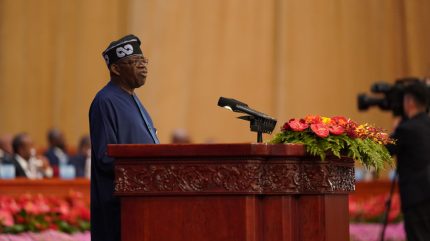
At an event commemorating 64 years of Nigerian independence, President Bola Ahmed Tinubu claimed that his government’s reforms have attracted over $30b in foreign direct investments in the last year.
He pressed on the need to go further: “If we do not correct the fiscal misalignments that led to the current economic downturn, our country will face an uncertain future at the peril of unimaginable consequences.”
Tinubu reiterated his commitment to free market policies, ensuring access for investments, and loosening market barriers without compromising on an effective regulatory framework.
He also assured that ministerial approval for a $10b investment from Exxon Mobil Corp was days away. The proposal was announced during the UN General Assembly in New York by Nigeria’s Vice President Kashim Shettima.
Exxon wants to focus the investment on its Owo project, a substantial deep-water initiative. Exxon Mobil Nigeria CEO, Shane Harris, said that they were working with Tinubu “to secure favourable fiscal arrangements that will make significant investment possible.” It underlines the potential of public-private collaboration in the FDI space.
Nigeria’s oil habit
Tinubu, who took office in May of 2023, made some drastic changes quickly into his rule. Most consequential was the decision to scrap the nation’s fuel subsidies that, although costly for the state, had been popular in the country.
How well do you really know your competitors?
Access the most comprehensive Company Profiles on the market, powered by GlobalData. Save hours of research. Gain competitive edge.

Thank you!
Your download email will arrive shortly
Not ready to buy yet? Download a free sample
We are confident about the unique quality of our Company Profiles. However, we want you to make the most beneficial decision for your business, so we offer a free sample that you can download by submitting the below form
By GlobalDataThe abrupt change, which investors and Tinubu hoped would kickstart the economy, resulted in soaring inflation and dissatisfaction from a population that saw their fuel prices triple overnight.
There is a certain irony to such an uptick in fuel prices in Nigeria, given it is the second-largest oil and gas producer in Africa. The country has relied on imports of petroleum products for years- a result of the underproduction of government-owned refineries.
In June, Reuters obtained a draft document showing that Nigeria was likely to spend $3.7b in 2024 to keep oil prices fixed, 50% more than they spent in 2023. It also suggested that the government will target oil production of 2 million barrels per day by December, 600,000 more than now. Tinubu said that the draft was still only a proposal.
Structural obstacles
Nigeria has faced other structural problems in attracting FDI. Namely financial corruption, insurgency groups and narrow economic policies.
In August, Nigeria’s Oil and Gas Free Zone Authority and the Nigerian Financial Intelligence Unit met to discuss a partnership that would bolster FDI interest. The collaboration will focus mainly on the areas of anti-money laundering and counter-terrorism financing in oil and gas-free zones.
While Nigeria may be working on attracting investments in its oil and gas sector, its lack of diversification may catch up to it in a world that is increasingly transitioning away from fossil fuels.



